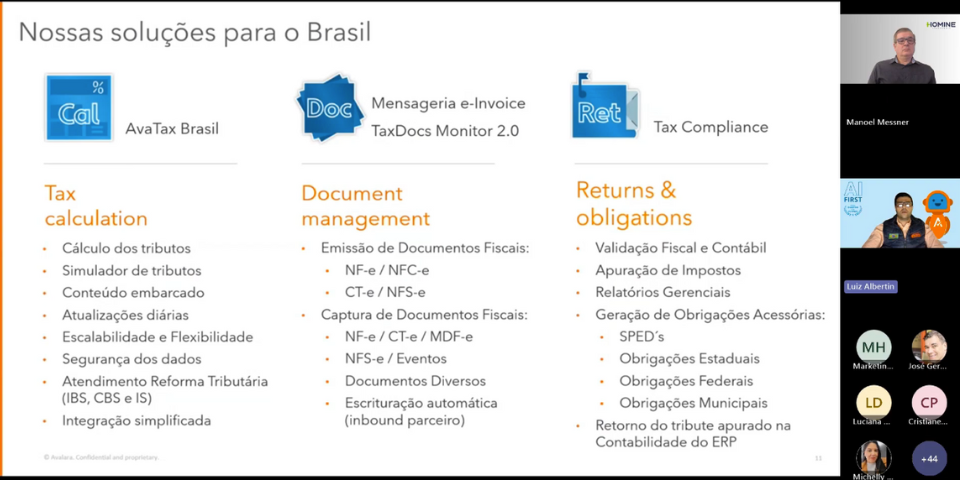Tax Reform, Digital Transformation and the Role of Automation: Key Insights from the 1st Episode of Homine Talks, which featured Luiz Albertin, Solutions Engineer at Avalara

Understand DIFAL once and for all: check out the main lessons learned from our simplified DIFAL webinar, with Graziella Santos
April 7, 2025
Reforma Tributária no SAP: o que sua empresa precisa fazer agora para estar pronta até dezembro
11 de August de 2025O Homine Talks is the new interview program from Homine Tecnologia, with the purpose of discussing strategic issues that directly impact the fiscal, tax, technological and business management universe. In the series premiere, the Talks hosted Luiz Albertin, senior solutions engineer at Avalara Brazil, for a frank conversation about the impacts of Tax Reform and the role of technology in this new scenario. With over 18 years of experience in the tax area, Albertin clearly addressed the challenges and opportunities for companies of all sizes, highlighting the importance of acting now.
Albertin got straight to the point: companies that have not yet started preparing for the Reform are behind the times. “These are already a step behind. The tax authorities are taking action, there is a lot of information available. Those who haven’t started need to start as soon as possible, yesterday.”, alert.
For him, the Reform goes far beyond replacing taxes — it is a structural transformation. “We still see companies focused only on changing tax rates, but this is superficial. What is underway is a profound change in the way taxes are calculated, assessed and even accounted for.”
The first step, according to Albertin, is the complete mapping of the company's operations. There are four fronts: tax operations, internal processes, systemic scenario and IT architecture. “Without this, there is no way to put together an efficient transition strategy. And you can’t do it alone. You need to have a specialized consultancy firm, like Homine, at your side, to be a partner in this process.”
Another highlight, addressed by Albertin, concerns the adaptation of systems and ERPs. “There are outdated versions that will not even receive the updates required by the Reform. If the ERP is not prepared, it becomes a bottleneck — and a serious one.” Albertin also reinforces the essential role of complementary solutions: “The ERP, no matter how good it is, will not be able to do it alone. The tax calculation engine becomes the protagonist.”
The calculation engine is a complementary solution to the ERP, responsible for automatically calculating taxes based on the most up-to-date tax rules. The solution already incorporates tax content — such as rates, regimes, exceptions and specific obligations — and eliminates the need to manually maintain these updates within the ERP. According to Albertin, this technology ensures that, when issuing or receiving an invoice, the system correctly applies the current rules, even in the face of constant changes in legislation. “You transfer this responsibility to a specialized solution, with embedded content and continuous updates. This reduces risks, avoids errors and ensures compliance”, highlights.
The expert also warned about the volume of changes in electronic tax documents, one of the crucial points of the Tax Reform: “We have already identified more than 100 new fields for tax documents. This data needs to be correct, both when issuing and receiving. In January 2026, if this is not ready, the operation will simply stop.”
Automation, according to him, is no longer a choice for companies and is becoming an imperative: “The tax authorities will calculate taxes daily. We can no longer rely on spreadsheets or manual processes. The Reform is the catalyst for a digital transformation that should already be happening.”
At the end of the program, the specialist commented on the future of tax professionals in light of the tax transition and its impact on operations, such as task automation. “Those who work in the tax area will need to be more analytical, quick, and understand technology and automation. It’s a new profile that is emerging”, concludes.
Watch the full episode of Homine Talks and prepare your company for the turnaround: https://www.youtube.com/watch?v=PE6gODnctJQ&t=2222s
If you are interested, schedule a free consultation with our team of SAP experts to assess the level of compliance of your ERP with the new tax requirements and learn about essential solutions for your company in this transition. Click and schedule here.




